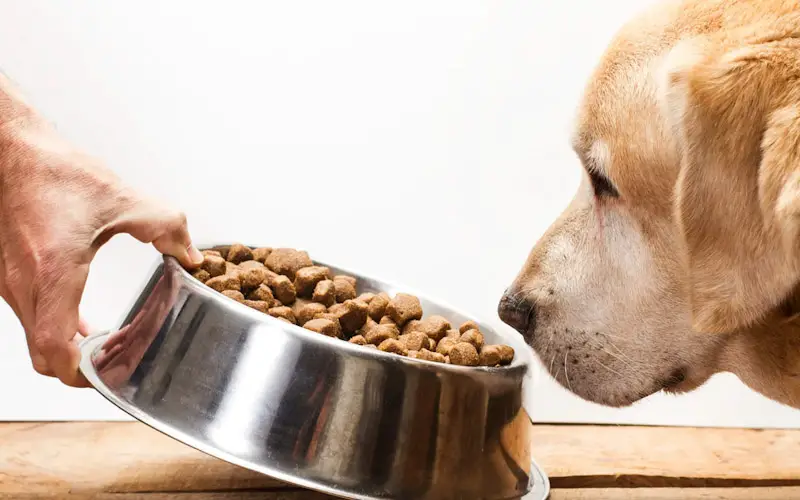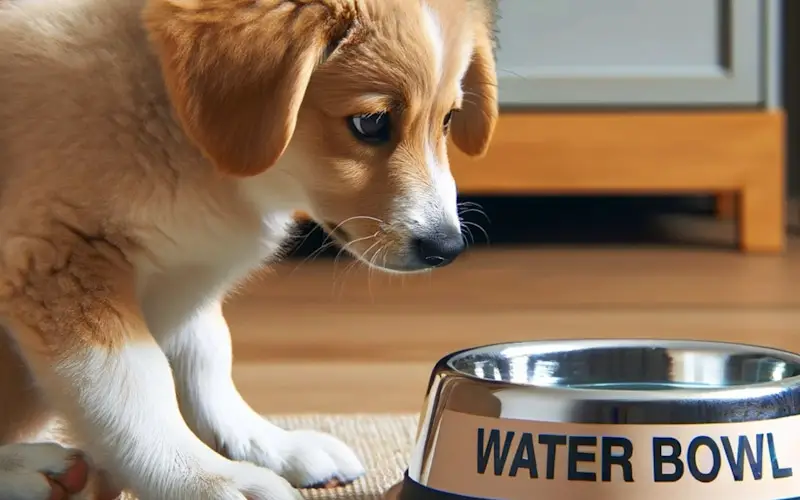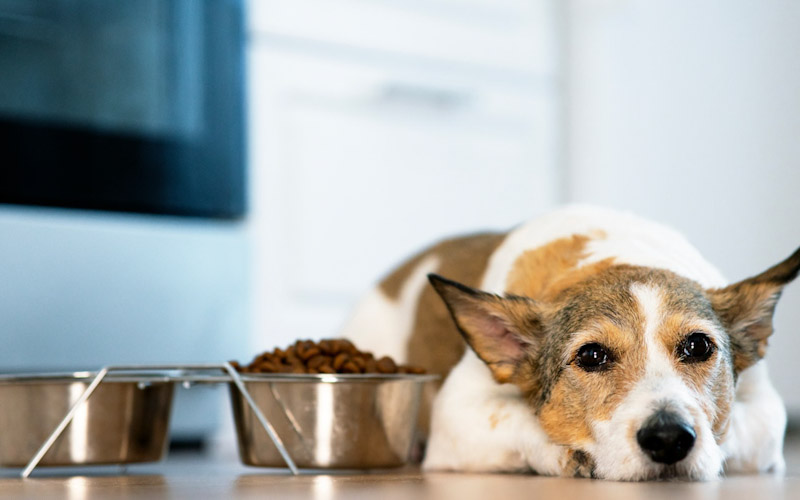Is your dog not eating but drinking water? This can be a worrying sign for any pet owner, as it may indicate a health problem or a behavioral issue. While some dogs may skip a meal occasionally, a prolonged loss of appetite can be a serious concern.

It is important to seek veterinary advice promptly, especially if your dog shows other symptoms such as vomiting, diarrhea, lethargy, or weight loss. Your vet can diagnose the underlying cause and provide the appropriate treatment for your dog.
In this article, we will cover the following topics:
- Understanding the causes of appetite loss in dogs
- When to see a vet for your dog’s appetite loss
- Home care tips for your dog’s appetite loss (if applicable)
- Prevention strategies to avoid future appetite loss in dogs
Understanding the Causes of Appetite Loss in Dogs
There are many possible reasons why your dog might lose appetite while still drinking water. Some of the common causes are:
- Illness: Your dog may have an infection, a disease, or a parasite that affects their appetite. Some examples are kidney disease, liver disease, pancreatitis, diabetes, cancer, or worms. Your dog may also have a fever, pain, or nausea that makes them reluctant to eat.
- Dental problems: Your dog may have a toothache, a broken tooth, a gum infection, or a mouth injury that makes eating painful or difficult. Your dog may also have bad breath, drooling, or bleeding from the mouth.
- Stress: Your dog may be stressed by a change in their environment, such as moving to a new home, introducing a new pet, or losing a family member. Your dog may also be anxious about loud noises, strangers, or separation from you.
- Dietary changes: Your dog may be picky about their food, especially if you have recently switched to a new brand, flavor, or type of food. Your dog may also have a food allergy or intolerance that causes them to reject their food.
- Medication: Your dog may be taking medication that affects their appetite, such as antibiotics, steroids, or painkillers. Your dog may also have a side effect or an adverse reaction to the medication that makes them nauseous or sick.
These are some of the common causes of appetite loss in dogs, but there may be other factors involved. It is best to consult your vet for a proper diagnosis and treatment.

When to See a Vet for Your Dog’s Appetite Loss
If your dog is not eating but drinking water, you should monitor their condition closely and see a vet as soon as possible. A prolonged loss of appetite can lead to dehydration, malnutrition, and organ failure in dogs.
You should see a vet immediately if your dog shows any of the following signs:
- Vomiting or diarrhea for more than 24 hours
- Blood in the vomit or stool
- Lethargy or weakness
- Difficulty breathing or coughing
- Pale gums or tongue
- Swollen abdomen or signs of pain
- Unexplained weight loss or gain
- Seizures or tremors
- Loss of coordination or balance
Your vet will examine your dog and perform some tests, such as blood work, urine analysis, x-rays, or ultrasound, to determine the cause of their appetite loss. Your vet will then prescribe the appropriate medication or treatment for your dog, such as antibiotics, fluids, supplements, or surgery.
Home Care Tips for Your Dog’s Appetite Loss (if applicable)
Disclaimer: These tips are not a substitute for professional veterinary advice and should only be followed after consulting your vet. Do not give your dog any medication or treatments without your vet’s approval.
If your vet has ruled out any serious medical conditions and has given you the green light to care for your dog at home, you can try some of these simple home care tips to encourage your dog’s appetite:
- Offer a bland diet: You can feed your dog a bland diet of boiled chicken and rice, or a canned food that is easy to digest. Avoid any foods that are spicy, fatty, or rich, as they may upset your dog’s stomach. You can also add some low-sodium chicken broth or water to the food to make it more appealing and hydrating.
- Offer small and frequent meals: You can feed your dog small and frequent meals throughout the day, rather than one or two large meals. This can help your dog digest their food better and avoid overeating or under eating. You can also warm up the food slightly to enhance the aroma and flavor.
- Offer gentle encouragement: You can gently encourage your dog to eat by praising them, petting them, or hand-feeding them. You can also try to make mealtime more fun and interactive by using a puzzle feeder, a treat dispenser, or a toy that dispenses food. Avoid forcing your dog to eat or scolding them, as this may stress them out more and worsen their appetite loss.
- Reduce stress: You can try to reduce your dog’s stress by providing them with a comfortable and quiet place to eat, away from any distractions or noises. You can also play soothing music, use calming scents, or provide your dog with a favorite toy or blanket. You can also spend more time with your dog, giving them attention, affection, and exercise, to help them relax and feel secure.
These are some of the home care tips that might help your dog regain their appetite while waiting for your vet’s advice. However, if your dog’s condition does not improve or worsens, you should contact your vet immediately for further guidance.

Prevention Strategies to Avoid Future Appetite Loss in Dogs
To prevent your dog from losing their appetite in the future, you can follow some of these prevention strategies:
- Regular vet checkups: You should take your dog to the vet for regular checkups, at least once a year, or more often if your dog is older or has a chronic condition. Your vet can monitor your dog’s health, detect any problems early, and provide the necessary treatment or prevention.
- Proper diet: You should feed your dog a high-quality, balanced, and complete diet that meets their nutritional needs and preferences. You should also avoid any foods that are harmful or toxic to dogs, such as chocolate, grapes, onions, garlic, or xylitol. You should also limit any treats or table scraps, as they may cause obesity, diabetes, or pancreatitis in dogs.
- Managing stress: You should try to minimize any stress factors that may affect your dog’s appetite, such as changes in their environment, routine, or family. You should also provide your dog with a safe and comfortable space, where they can rest and relax. You should also socialize your dog with other people and animals, and train them to cope with any anxiety or fear issues.
- Dental care: You should take care of your dog’s dental health, by brushing their teeth regularly, providing them with dental chews or toys, and taking them to the vet for dental cleaning or treatment. This can prevent any dental problems that may cause pain or difficulty in eating.
By following these prevention strategies, you can help your dog maintain a healthy appetite and a happy life.
Conclusion
A dog not eating but drinking water can be a sign of a health problem or a behavioral issue. It is important to seek veterinary advice promptly, especially if your dog shows other symptoms or has a prolonged loss of appetite. Your vet can diagnose the cause and provide the appropriate treatment for your dog.
You can also try some home care tips to encourage your dog’s appetite, such as offering a bland diet, small and frequent meals, gentle encouragement, and reducing stress. However, these tips are not a substitute for professional veterinary advice and should only be followed after consulting your vet.
You can also prevent future appetite loss in dogs by taking your dog to the vet regularly, feeding them a proper diet, managing their stress, and taking care of their dental health.
We hope this article has been helpful and informative for you. If you have any questions or comments, please feel free to share them below. You can also check out our other articles on pet care topics, such as How to Train Your Dog to Sit or How to Choose the Best Dog Food.
Thank you for reading and happy pet parenting!
